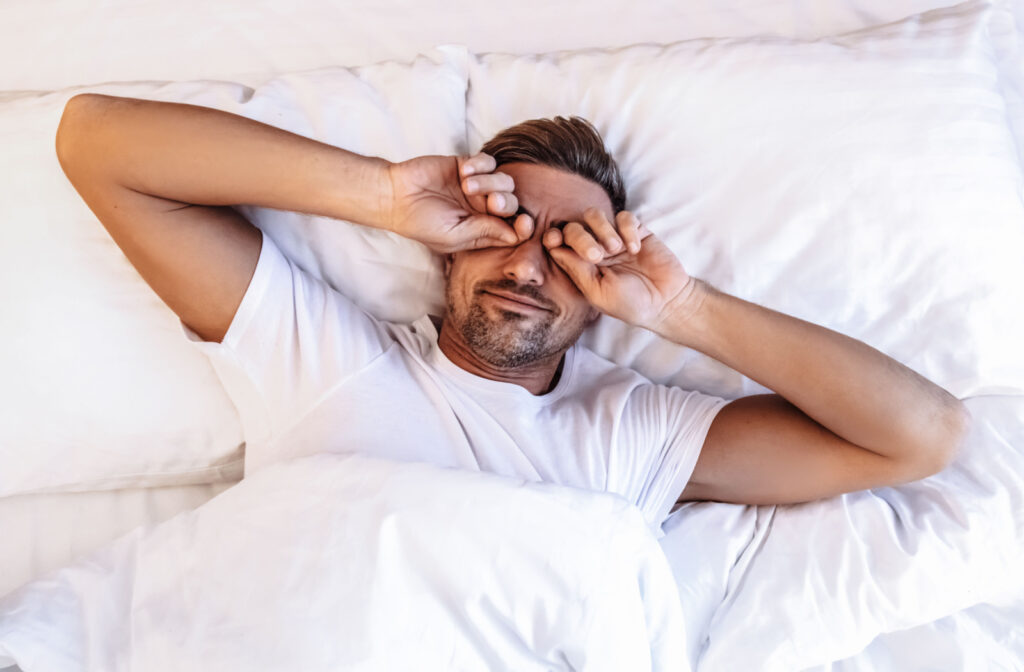Waking up to dry, uncomfortable eyes is a common issue affecting people of all ages. There are a wide range of reasons why you might be dealing with this discomfort. If fatigue isn’t the culprit behind your dry eyes, an eye exam could help pinpoint the root issue.
Reasons your eyes are dry when you wake up can include:
- Not enough sleep
- Allergies
- Contact lens irritation
- Dehydration
- Medications
- Environmental factors
- Underlying infections
Not Enough Sleep
A big culprit behind those morning dry eyes is as simple as not getting enough sleep. When you’re short on shut-eye, your eyes have to work harder to stay moist, and that can leave them feeling parched and uncomfortable.
The solution is pretty simple: try to get more sleep! At least 7–8 hours each night.
Eyes Open at Night
Something interesting to know: 1 out of 5 people deal with something called nocturnal lagophthalmos. It’s a term for sleeping with your eyes open. This can be due to issues with nerves and muscles, damage to your eyelids, or even thyroid-related eye symptoms.
Usually, we close our eyes when we sleep. This helps to keep the light out, shields our eyes, and keeps them nice and hydrated. But those dealing with nocturnal lagophthalmos can be left with dehydrated eyes, exposure to the environment, and often, a less than restful sleep.
If this goes unchecked, it can lead to problems like impaired vision, eye infections, and cornea damage—though not always. It can be beneficial to discuss this possibility with your eye doctor if you’re waking up with dry eyes.
Allergies
Allergies are another usual suspect when it comes to dry eyes in the morning. Exposure to allergens such as pollen, dust, or other irritants can lead to inflammation and dryness in your eyes, causing discomfort upon waking.
To alleviate this issue, it’s advisable to minimize your exposure to these allergens as much as possible. If necessary, use of allergy-specific eye drops or antihistamines may be required.
Contact Lenses
Contact lenses could be the cause behind your morning dry eyes. They can limit the oxygen supply to your eyes, which can leave them feeling parched and less than comfortable.
Think about using some eye drops that are made just for those who wear contact lenses, or maybe give your eyes a break by using your glasses for a few days.
Getting Older
With advancing age, the natural oil production within our bodies diminishes, leading to conditions such as dry and irritated eyes. This scenario is particularly prevalent in women due to certain hormonal changes that can interfere with eye lubrication.
To alleviate this issue, consider using eye drops specifically designed for dry eyes. Additionally, adding more omega-3 fatty acids into your diet regimen may prove beneficial.
Dehydration
If you’re waking up with dry eyes, it might be because you’re not getting enough water. When you’re dehydrated, your body can’t make enough tears to keep your eyes moist.
What can you do about it? Well, you’ve got to make sure you’re drinking lots of water all day long. And you might want to think about cutting back on the caffeine and alcohol, too.
Certain Medications
If you’re taking certain types of medications, like antihistamines or antidepressants, they could be the reason you’re waking up with dry eyes. If that’s the case for you, it might be worth having a chat with your doctor. They could suggest other options, or maybe there’s a way to manage the dryness without changing your medication.
Environmental Factors
Sometimes it’s the world around you causing your dry eyes in the morning. Environmental factors like air conditioning, a windy day, or even just dry air can be the cause of your dry eyes. But, what can you do about it?
Popping a humidifier in your bedroom at night or even a bowl of water can help get some moisture back in the air. And if you’re heading out, don’t forget your sunglasses to keep your eyes safe from the wind and dry conditions.
Blepharitis
Blepharitis is a common condition that causes inflammation of the eyelids. This can cause dry, red, and swollen eyes, particularly in the morning. If you suspect you have blepharitis, consult your eye doctor for an exam and treatment.
Medical Conditions
If you’re dealing with medical conditions like Sjogren’s syndrome, rheumatoid arthritis, or lupus, they could be the reason you’re having dry eyes. It’s one of the symptoms that comes along with them.
So, if that’s what’s going on, it’s important to speak to your doctor and stick to any treatment plan you’ve been given.
Eye Strain
Your dry eyes could be due to eye strain if you’re often immersed in reading or fixated on computer screens. To combat this issue, it’s a good idea to take regular breaks.
Here’s a helpful method: the 20-20-20 rule. It simply means that every 20 minutes, you should divert your gaze from the screen and focus on an object 20 feet away for 20 seconds. This practice can really make a difference for your eyes.
Dry Eye Treatment Options
IPL
Intense pulsed light, widely known as IPL, can be beneficial for those contending with dry eye discomfort. This innovative treatment delivers gentle warmth to the skin around the eyes, optimizing the function of the meibomian glands, while simultaneously enhancing collagen production and reducing inflammation—yielding both therapeutic and aesthetic advantages.
RF Treatment
Radiofrequency treatment is a cutting-edge treatment that uses electromagnetic waves applied to the skin around the eye. Devices such as TempSure Envi are used to loosen and remove blockages in the meibomian glands that contribute to meibomian gland dysfunction (MGD), helping to alleviate dry eye symptoms.
Medicated Drops
We offer medicated eye drops like RESTASIS and Xiidra. They’re great because they help control inflammation and boost your tear production. It’s like giving your eyes a refreshing drink!
Punctal Plugs
Punctal plugs are inserted into your tear ducts to slow down the drainage of tears, which helps keep your eyes moist and comfortable.
Lid Scrubs
Cleaning your eyelids regularly with these lid scrubs can help prevent dry eyes by keeping the area clean and reducing the chances of irritation or infection.
Amniotic Membranes
But what if you’re dealing with a severe case of dry eyes? That’s when they use amniotic membranes. These have an amazing ability to restore and heal a damaged cornea.
TearCare
And finally, there’s the TearCare System. This is specifically for those dealing with meibomian gland dysfunction (MGD). This is a disease that can really interfere with your tear production and lead to severe dry eyes if it’s not treated. The TearCare System helps manage this condition and provides much-needed relief.
Understanding & Treating Morning Dry Eye
We offer treatment options so you don’t have to start your day with discomfort. Book an appointment online with Bluebird Vision + Wellness. We’ll work with you to help keep your eyes feeling fresh and lubricated, right from the moment you open them in the morning.




